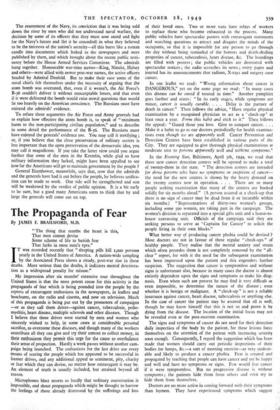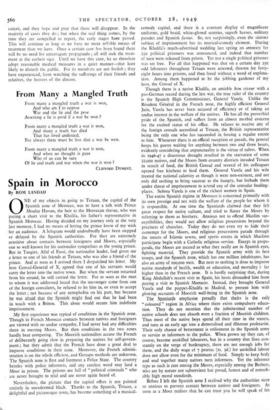The Propaganda of Fear
By JAMES F. BRAILSFORD, M.D.
" The thing that numbs the heart is this, That men cannot devise Some scheme of life to banish fear That lurks in most men's eyes."
IT was recorded recently that " sleeping pills kill i,000 persons yearly in the United States of America. A nation-wide sampling by the Associated Press shows a steady, post-war rise in these deaths. More serious than the deaths, it indicates mental deteriora- tion as a widespread penalty for misuse."
My impression after six months' extensive tour throughout the United States is that the most potent cause for this activity is the propaganda of fear which is being pounded into the people by the reports of extravagant enthusiasts in the newspapers, in leaflets and brochures, on the radio and cinema, and now on television. Much of this propaganda is being put out by the promoters of campaigns —or as they call them drives—against cancer, tuberculosis, polio- myelitis, heart disease, multiple sclerosis and other diseases. Though I believe that these drives were started by men and women who sincerely wished to help, in some cases at considerable personal sacrifice, to overcome these diseases, and though many of the workers contribute all they can give and try their utmost to collect money, in their enthusiasm they permit this urge for the cause to overbalance their sense of proportion. Hardly a week passes without another cam- paign being launched. The enthusiasts for the last drive use every means of scaring the people which has appeared to be successful in former drives, and any additional appeal to sentiment, pity, charity or fear which they can devise, no matter how extravagant it may be. An element of truth is usually included, but strained beyond all reason.
Microphones blast streets so loudly that ordinary conversation is impossible, and shout propaganda which might be thought to harrow the feelings of those already distressed by the sufferings and loss of their loved ones. Two or more vans have relays of workers to replace those who become exhausted in the process. Many public vehicles have spectacular posters with extravagant statements and searching questions to attract and disquiet the minds of the occupants, so that it is impossible for any person to go through the day without being reminded of the horrors and death-dealing properties of cancer, tuberculosis, heart disease, &c. The hoardings are filled with posters ; the public vehicles are decorated with spectacular notices ; the radio screeches its news ; every paper and journal has its announcements that radium, X-rays and surgery cure cancer.
In one leaflet we read: " Wrong information about cancer is DANGEROUS," yet on the same page we read: " In many cases this disease can be cured if treated in time." Another pamphlet goes further and states : " In its early stages, while symptoms are minor, cancer is usually curable. . . . Delay is the partner of death in cancer." Then follows the advice, " Have regular physical examination by a recognised physician to act as a ' check-up' at least once a year. Form this habit and stick to it." Then follows the appeal: " Guard those you love. Give to conquer cancer. . . . Make it a habit to go to our doctors periodically for health examina- tions even though we are apparently well. Cancer Prevention and Detection Centres have been established in various parts of the City. They are equipped to give thorough physical examinations at moderate cost to persons apparently well and without symptoms."
In the Evening Sun, Baltimore, April 5th, 1949, we read that three new cancer detection centres will be opened to make a total of twenty-three in the state. " The detection centres are intended for those persons who have no symptoms or suspicion of cancer— the need for the new centres is shown by the heavy demand on the twenty centres now in operation. . . . There are so many people seeking examination that many of the centres are booked solidly for six months ahead." (A person assured at a check-up that there is no sign of cancer may be dead from it or incurable within six months.) " Representations of thirty-two women's groups, including some 50o women, are taking part in the campaign. The women's division is separated into a special gifts unit and a house-to- house canvassing unit. Officials of the campaign said they are seeking persons to serve as Captains for Cancer' to solicit the people living in their own blocks."
What better way of producing cancer phobia could be devised ? Most doctors are not in favour of these regular " check-ups " of healthy people. They realise that the mental anxiety and strain which often precedes them is not completely removed by the "all- clear " report, for with it the need for the subsequent examination has been impressed upon the patient and this engenders further suspicion. The suggestion that cancer is symptomless and without signs is unfortunate also, because in many cases the doctor is almost entirely dependent upon the signs and symptoms to make his diag- nosis. Even when such are present he may find it very difficult or even impossible, to determine the nature of the disease ; even whether it is benign or malignant. A " check-up " is not a reliable insurance against cancer, heart disease, tuberculosis or anything else. In the case of cancer the patient may be assured that all is well, though he may know himself that this is not so and prove it by dying from the disease. The location of the initial focus may not be revealed even at the post-mortem examination.
The signs and symptoms of cancer do not need for their detection daily inspection of the body by the patient, for these lesions force themselves on the attention of the patient with increasing severity soon enough. Consequently, I regard the suggestion which has been made that women should carry out periodic inspections of their bodies for lumps, &c.—a sort of morning exercise—as very undesir- able and likely to produce a cancer phobia. Fear is created and propagated by teaching that people can have cancer and yet be happy and well and have no symptoms or signs. Few would fear cancer if it were symptomless. But no progressive disease is without symptoms ; the patients hide them from others and even try to hide them from themselves.
Doctors are no more active in corning forward with their symptoms than laymen. They have experienced symptoms which suggest cancer, and they hope and pray that these will disappear. In the majority of casts they do ; but when the real thing comes, by the time they are compelled to report, the early stages have passed. This will continue as long as we have no more re!inble means of treatment than we have. Once a certain cure has been found there will be no need for extravagant propaganda ; all will seek the treat- ment at the earliest sign. Until we have this cure, let us therefore adopt reasonable medical measures in a quiet manner—that least likely to disturb the public. For its members are not foolish ; they have experienced, from watching the sufferings of their friends and relatives, the horrors of the disease.







































 Previous page
Previous page